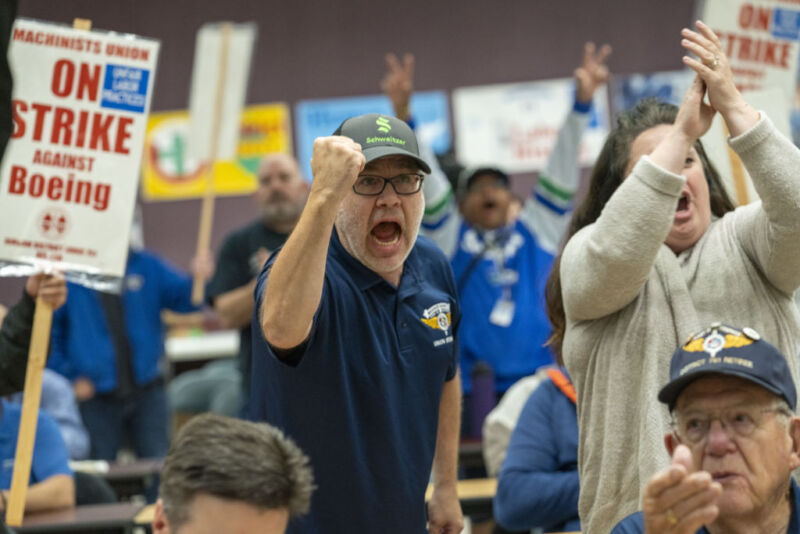
More than 33,000 unionized Boeing workers went on strike Friday, rejecting what they say are unfair terms of a tentative agreement the aerospace company reached with their union.
The rejected deal tried to convince workers, but failed. Boeing offered a 25 percent wage increase and promised to build Boeing's next jet in the Puget Sound region of Washington. Boeing said that would provide “job security for generations to come.”
But after Jon Holden, president of District 751 of the International Association of Machinists and Aerospace Workers (IAM), called on the union to accept the deal (which Boeing called the “largest overall wage increase ever” in the company's history), hundreds of Boeing workers immediately began to protest, ahead of a vote on Thursday that ultimately doomed the deal.
Rather than accept a deal that jeopardized the company’s desired 40 percent wage increase and eliminated workers’ annual bonuses, about 96 percent of workers voted to strike, The Washington Post reported. Rather than accept what Boeing offered, workers seized on rare pressure amid Boeing’s financial and production woes to seek better terms.
“We have a lot of leverage, why waste it?” Joe Philbin, a construction worker, told the Post ahead of the vote at a union hall in Seattle on Thursday. Philbin has been at Boeing for just six months, but already wants changes to the rules on mandatory overtime.
An overwhelming majority of the union agreed that the deal was not good enough, so Holden told the assembled workers, “We're striking at midnight.”
The declaration prompted loud cheers from workers who chanted, “Strike! Strike! Strike!”
Boeing workers haven't walked away since 2008when a 57-day strike cost Boeing about $1.5 billion, the Post reported. Analysts told Bloomberg that the current strike is also estimated to last about 50 days, potentially costing Boeing between $3 billion and $3.5 billion. billion.
The aerospace company can’t afford any work stoppage, let alone a strike by workers who “play a key role in assembling some of the company’s best-selling planes,” which the Post said could be the “most disruptive challenge yet” for the company. Analysts told the Post that a prolonged strike, in addition to assembly delays at crucial factories in Washington, could hurt Boeing’s suppliers and market share.
The Boeing spokesperson told Ars that the company is eager to get back to the negotiating table.
“The message was clear that the tentative agreement we reached with IAM leadership was not acceptable to members,” the Boeing spokesman said. “We remain committed to resetting our relationship with our employees and the union, and we are ready to return to the table to reach a new agreement.”
Why did Boeing workers reject the deal?
Boeing likely anticipated that the deal would not be good enough after Holden told The Seattle Times on Wednesday that workers would likely vote to strike.
Two days earlier, Holden had sent a message to employees after receiving “hundreds of messages and emails” raising concerns about the tentative deal he was recommending they accept.
“Emotions are running high,” Holden admitted.
Holden told employees it would be impossible to respond to everyone individually and assured them the preliminary agreement was not binding.
“A tentative agreement is not certain or set in stone, and it is certainly not final,” Holden told workers, adding that the deal simply represented the best terms the union could get Boeing to agree to without a strike.

